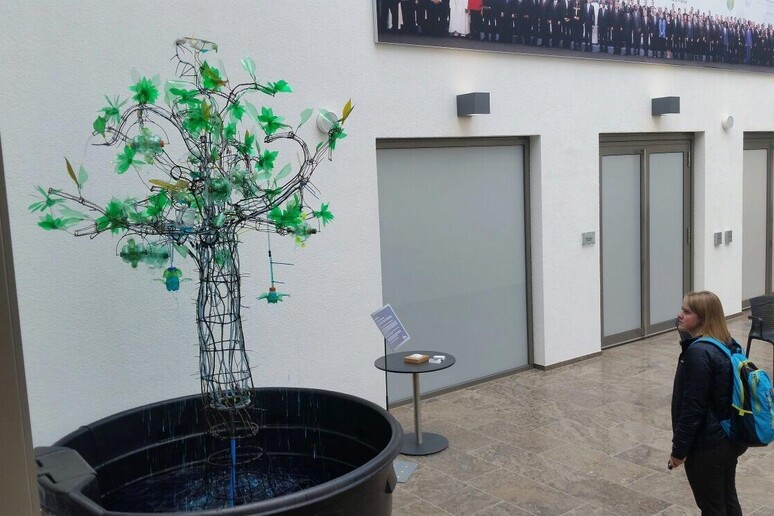The Rome-based International Fund
for Agricultural Development (IFAD) said Tuesday that an artwork
is sponsored is drawing attention to the impact that climate
change is having on rural communities in developing countries at
the United Nations' Climate Summit (UNFCCC COP23) in Bonn,
Germany.
British artist Silas Birtwistle's Biomimic Tree is an
installation uses recycled plastic to depict a tree which only
fully comes alive when water runs through it, said IFAD, a UN
agency that is helping smallholder farmers adapt to and mitigate
climate change,.
"At the bottom of the tree there is a small pump which takes
water through a series of clear pipes to fruit and birds, which
all gently move, turn, spin and chatter in response," said Silas
Birtwistle.
"Every five minutes, the pump will activate and the tree will
come to life, water will trickle, the birds will sing and the
leaves will flutter."
This sculpture highlights the dependence of all living things
on a functioning healthy ecosystem. The tree provides food and a
home to animals and birds. It also offers shelter from wind and
shade from sun, allowing crops to thrive and feed families.
Trees also stop topsoil erosion in arid areas and can act as
extremely effective carbon sinks.
"The water running through the tree highlights the increasing
importance of this critical resource due to climate change,"
said IFAD's Environment and Climate Division Director, Margarita
Astralaga. "When the water is running the tree comes to life,
when the water stops the tree comes to a stop, or dies."
She added, "Right now climate change issues such as water
scarcity and erratic weather patterns are adversely affecting
smallholder farmers in the developing world. But IFAD-led
solutions are empowering them to combat and overcome these
issues. "
In its new Strategic Framework IFAD has renewed its commitment
to enhancing biodiversity alongside increasing agricultural
productivity and lowering greenhouse gas emissions from
agriculture while contributing to poverty reduction.
"The sculpture highlights IFAD's restoration efforts which
focuses on planting trees on degraded lands to stop soil
erosion, form a barrier to desertification and provide shelter
to crops," added Birtwistle.
In the Sahel region of Africa IFAD has already rehabilitated
almost 300,000 hectares. For example, in Niger IFAD regenerated
100,000 hectares by protecting land from overgrazing and
deforestation and replanting trees. Once barren land now has
approximately 50 trees per hectare. In total IFAD's agroforestry
and related activities have contributed to the removal of over
58,000 tons of carbon dioxide from the atmosphere.
"We wanted negotiators at UNFCCC COP23 to see for themselves the
beauty of sustainable climate resilient agriculture and the
crucial role this plays in the wellbeing of rural communities,"
said Birtwistle.
"Farmers have to work with nature to create a truly sustainable
food secure future," said Astralaga. "Working with Silas,
exhibiting this amazing Biomimic Tree, we show the very real
challenge of climate change and environmental sustainability for
smallholder farmers in developing countries.''
IFAD's investments, including the Adaptation for Smallholder
Agriculture Programme (ASAP), help farmers in a variety of ways,
from installing weather forecast systems, to introducing new
drought resistant crop varieties, as well as setting up farmer
field schools where knowledge and new climate smart agriculture
techniques can be demonstrated and disseminated.
ALL RIGHTS RESERVED © Copyright ANSA











